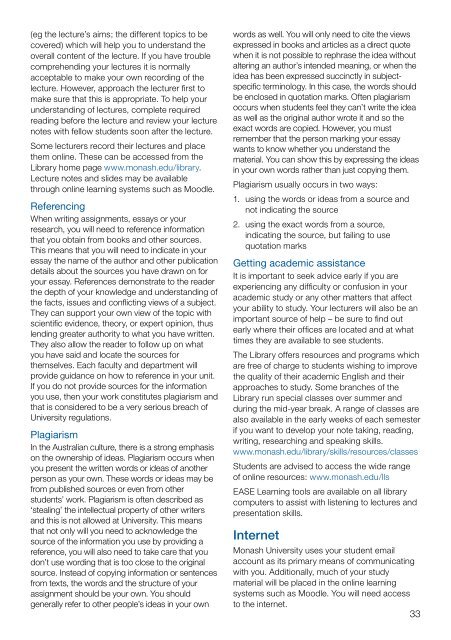Destination
You also want an ePaper? Increase the reach of your titles
YUMPU automatically turns print PDFs into web optimized ePapers that Google loves.
(eg the lecture’s aims; the different topics to be<br />
covered) which will help you to understand the<br />
overall content of the lecture. If you have trouble<br />
comprehending your lectures it is normally<br />
acceptable to make your own recording of the<br />
lecture. However, approach the lecturer first to<br />
make sure that this is appropriate. To help your<br />
understanding of lectures, complete required<br />
reading before the lecture and review your lecture<br />
notes with fellow students soon after the lecture.<br />
Some lecturers record their lectures and place<br />
them online. These can be accessed from the<br />
Library home page www.monash.edu/library.<br />
Lecture notes and slides may be available<br />
through online learning systems such as Moodle.<br />
Referencing<br />
When writing assignments, essays or your<br />
research, you will need to reference information<br />
that you obtain from books and other sources.<br />
This means that you will need to indicate in your<br />
essay the name of the author and other publication<br />
details about the sources you have drawn on for<br />
your essay. References demonstrate to the reader<br />
the depth of your knowledge and understanding of<br />
the facts, issues and conflicting views of a subject.<br />
They can support your own view of the topic with<br />
scientific evidence, theory, or expert opinion, thus<br />
lending greater authority to what you have written.<br />
They also allow the reader to follow up on what<br />
you have said and locate the sources for<br />
themselves. Each faculty and department will<br />
provide guidance on how to reference in your unit.<br />
If you do not provide sources for the information<br />
you use, then your work constitutes plagiarism and<br />
that is considered to be a very serious breach of<br />
University regulations.<br />
Plagiarism<br />
In the Australian culture, there is a strong emphasis<br />
on the ownership of ideas. Plagiarism occurs when<br />
you present the written words or ideas of another<br />
person as your own. These words or ideas may be<br />
from published sources or even from other<br />
students’ work. Plagiarism is often described as<br />
‘stealing’ the intellectual property of other writers<br />
and this is not allowed at University. This means<br />
that not only will you need to acknowledge the<br />
source of the information you use by providing a<br />
reference, you will also need to take care that you<br />
don’t use wording that is too close to the original<br />
source. Instead of copying information or sentences<br />
from texts, the words and the structure of your<br />
assignment should be your own. You should<br />
generally refer to other people’s ideas in your own<br />
words as well. You will only need to cite the views<br />
expressed in books and articles as a direct quote<br />
when it is not possible to rephrase the idea without<br />
altering an author’s intended meaning, or when the<br />
idea has been expressed succinctly in subjectspecific<br />
terminology. In this case, the words should<br />
be enclosed in quotation marks. Often plagiarism<br />
occurs when students feel they can’t write the idea<br />
as well as the original author wrote it and so the<br />
exact words are copied. However, you must<br />
remember that the person marking your essay<br />
wants to know whether you understand the<br />
material. You can show this by expressing the ideas<br />
in your own words rather than just copying them.<br />
Plagiarism usually occurs in two ways:<br />
1. using the words or ideas from a source and<br />
not indicating the source<br />
2. using the exact words from a source,<br />
indicating the source, but failing to use<br />
quotation marks<br />
Getting academic assistance<br />
It is important to seek advice early if you are<br />
experiencing any difficulty or confusion in your<br />
academic study or any other matters that affect<br />
your ability to study. Your lecturers will also be an<br />
important source of help – be sure to find out<br />
early where their offices are located and at what<br />
times they are available to see students.<br />
The Library offers resources and programs which<br />
are free of charge to students wishing to improve<br />
the quality of their academic English and their<br />
approaches to study. Some branches of the<br />
Library run special classes over summer and<br />
during the mid-year break. A range of classes are<br />
also available in the early weeks of each semester<br />
if you want to develop your note taking, reading,<br />
writing, researching and speaking skills.<br />
www.monash.edu/library/skills/resources/classes<br />
Students are advised to access the wide range<br />
of online resources: www.monash.edu/lls<br />
EASE Learning tools are available on all library<br />
computers to assist with listening to lectures and<br />
presentation skills.<br />
Internet<br />
Monash University uses your student email<br />
account as its primary means of communicating<br />
with you. Additionally, much of your study<br />
material will be placed in the online learning<br />
systems such as Moodle. You will need access<br />
to the internet.<br />
33


